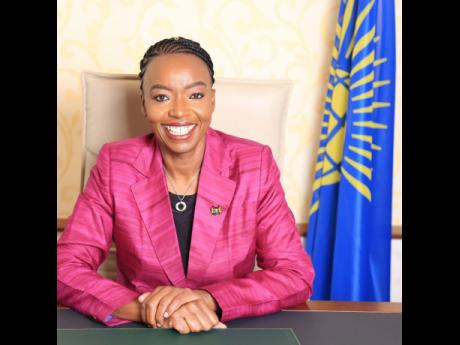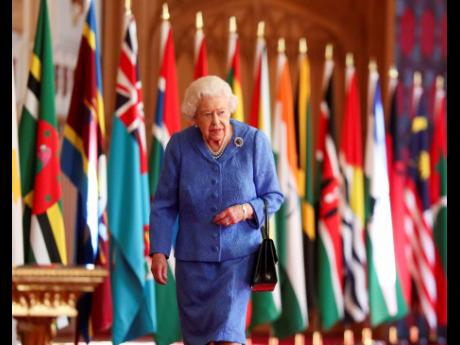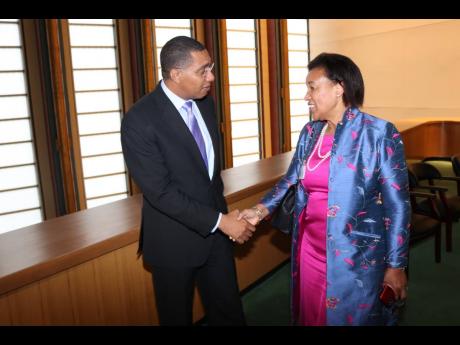‘Commonwealth must renew itself’
Kenyan diplomat hopes to be consensus candidate for SecGen
Kenyan diplomat Dr Monica Juma is hoping to become the consensus candidate for the position of Commonwealth secretary general after heads of government of the 54-country bloc rejected attempts to have the incumbent serve an automatic second four-year term earlier this year.
No stranger to holding sensitive positions, Juma is the Cabinet secretary (minister) of defence in the administration of President Uhuru Kenyatta of Kenya.
In a Sunday Gleaner interview last week, Juma said that she was not unduly bothered by talks of a waning interest in the Commonwealth of Nations – a political association of 54 member states, almost all of which are former territories of the British Empire.
Currently headed by Queen Elizabeth II, the Commonwealth heads of government appointed Charles, Prince of Wales to be her designator successor in 2018, although the position is not hereditary. The Queen is currently the head of state of 16 member states called Commonwealth realms, including Jamaica, while 33 members are republics and five have different monarchs.
While the usual convention is that an incumbent Commonwealth secretary general seeking a second term is elected unopposed, the proposal for Patricia Scotland’s automatic reappointment was rejected.
Funding pulled
Earlier this year, Australia and Britain pulled funding from the Commonwealth Secretariat after the organisation’s Audit Committee accused the former Northern Ireland attorney general of circumventing normal tendering rules to deliver a contract worth £250,000 to a friend.
Baroness Scotland’s lawyers insisted that the decision to award the contract was fully justified and complied with procurement procedures at the time.
Lady Scotland’s term at the helm of the London-based secretariat was due to expire in March but was initially extended until the Commonwealth Heads of Government Meeting (CHOGM) planned for June.
But with the CHOGM set for Rwanda postponed until at least next year – and possibly longer due to the coronavirus pandemic – her position has been extended until the next meeting can be held.
Lady Scotland has been supported to serve a second term by Dominica, her country of birth.
Juma believes there is strength in consensus among Commonwealth nations, not only in supporting her for the position, but as an integral plank for every major social, economic, or political decision.
“Questions about the relevance of the Commonwealth have arisen and many are asking if it is still of good value and is it necessary. The usefulness of the Commonwealth, like any other organisation, depends on the premium that the membership place on it. But that premium comes around three major points in my mind,” Juma told The Sunday Gleaner from Barbados, where she was attending the United Nations Conference on Trade and Development.
The three points, she said, are commitment, connections, and consensus.
“There must be a commitment to own the Commonwealth and together, shape the agenda, then pursue it in the light of the aspirations. The second one is the need to make connections because one of the important observations is that many Commonwealth nations have very limited [relationships] with each other. Unless you connect, you won’t understand one another, you can’t aspire together. So growing connections among the membership is critical. Connections also with others, that will enable us to look at the world in a different manner,” she explained.
Although member states have no legal obligations to one another, they are connected through their history and use of the English language.
The imperative to build consensus is fundamental, Juma noted.
“The Commonwealth was conceived as a consensus-forging arena. We need to build consensus that will clarify our agenda in a very volatile, uncertain-but-strategic environment. We need to see and define challenges the same way, pursue them together, and that means more and not less consensus,” she explained.
The role of the Commonwealth Secretariat becomes critical in facilitating consensus to drive a shared agenda for a shared future of prosperity for its membership, she told The Sunday Gleaner, “but also to make the Commonwealth a force for good in the world, for the members who are spread across the continents of the world – 2.4 billion people and US$13 trillion economies”.
Juma said the Commonwealth has huge potential to drive the interest of members states and “shine a light on humanity”.
She said: “The time requires that we reflect deeply on how to share the collective agenda. We need more – not less – solidarity, more – not less – connections and collaborations with the science to deal with the next pandemic because people are saying this is not the last pandemic. So we can’t just wait and be caught flat-footed.
“So history is pointing us in a direction of rethinking the future and how we manage that future so that it does not decimate humanity.”
Science clearly points out that certain things should be urgently done by individual countries and the globally collective, especially in the area of climate change, and the luxury of time is not available, Juma said, adding that the office of the Commonwealth Secretary General is charged with the responsibility of harnessing the diversity and range of opportunities within the bloc.
Vaccine politics
Turning to the issue of vaccination and vaccine politics as the world battles a deadly pandemic, Juma said that it is important that “the debate be driven around science and not domestic politics anywhere in the world”.
She told The Sunday Gleaner: “Science is what helps us to understand the extent of these pandemics. There must be a conversation around access to important and urgent medicines because it tells us that no one is safe until all are safe. The issue of access must become primary around the world,” she argued.
Addressing the ongoing internal conflicts in some member states such as the scourge of kidnappings in Nigeria as well as the seeming unwillingness of some states to help each other while quick to chastise, Juma said that the search for peace and stability was not just a Commonwealth or African endeavour.
Many countries are battling security challenges that are also not internal, national, or even regional, she noted, but were the effects of terrorism, which was a global problem. The movement of money and assets to cripple terror groups requires the building of connections that a secretariat could provide while member nations build connections among themselves.
All Commonwealth countries are now seeing their economies struggling, with smaller ones feeling it most, noted Juma, adding that threats of terrorism, and in Africa, drought and famine, remain present.
She noted that in recent years, there have also been threats to the core values of democracy in some states as it is also with some nations outside the bloc. But she highlighted the value in having election monitors watching each other’s voting processes where necessary to strengthen the electoral process.
“We have a history of the same common law, shared values such as the rule of law, and there is an understanding of the settlement mechanism. So it is easier to forge a common platform where we understand each other, and that is the understanding we have in invoking shared values,” she told The Sunday Gleaner.
In her current capacity in the Kenyan government, Juma oversees and executes the mandate of the Ministry of Defence, which is to “defend and protect the sovereignty and territorial integrity of the Republic of Kenya”.
Prior to her appointment to the post in January 2020, she served in the Ministry of Foreign Affairs (2018-2020) and was principal secretary in the Ministry of Interior and Coordination of National Government (2014-2015). There, she drove transformation in the national security sector and initiated work that led to the development of Kenya’s strategy on counter-terrorism, violent extremism, and the creation of the multiagency approach in tackling security challenges, including terrorism.
The world is at a historic crossroads, said Juma.
“We must ask, how are we going to share the future even with this unpleasant past so that [people] do not become slaves of their past but agents of the future? In order to face up to tomorrow’s threats, the Commonwealth, like all other entities, must reset itself. It cannot remain what we have been used to because of the imperative of change,” she said.



